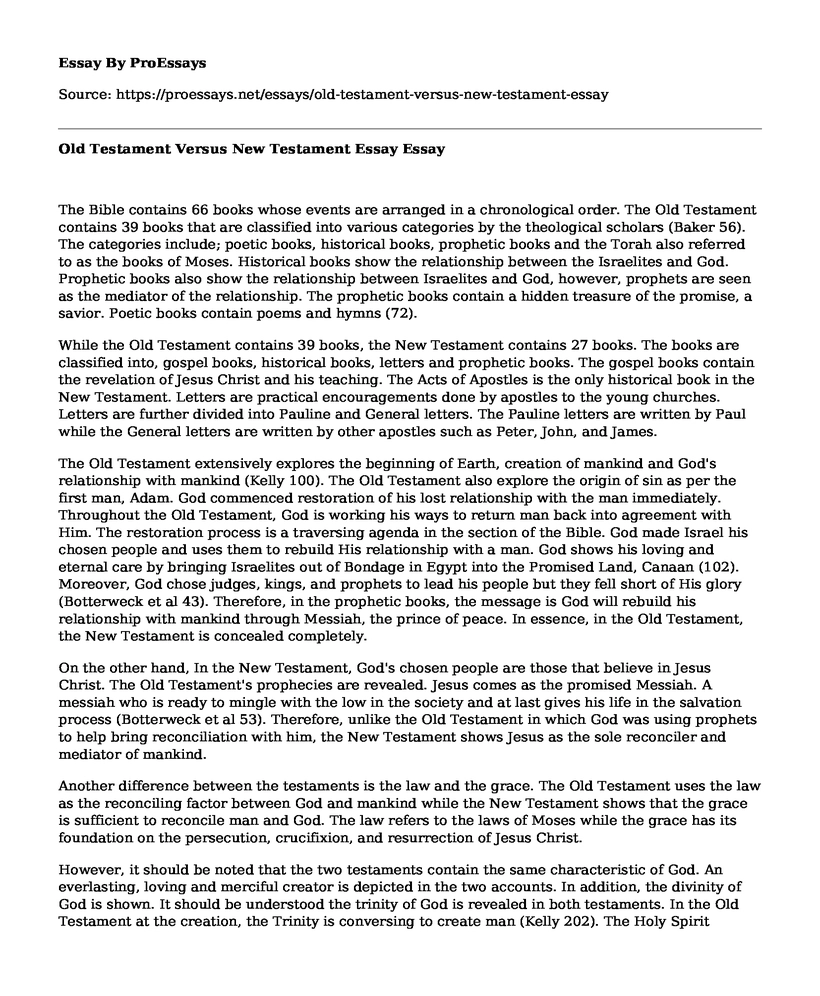The Bible contains 66 books whose events are arranged in a chronological order. The Old Testament contains 39 books that are classified into various categories by the theological scholars (Baker 56). The categories include; poetic books, historical books, prophetic books and the Torah also referred to as the books of Moses. Historical books show the relationship between the Israelites and God. Prophetic books also show the relationship between Israelites and God, however, prophets are seen as the mediator of the relationship. The prophetic books contain a hidden treasure of the promise, a savior. Poetic books contain poems and hymns (72).
While the Old Testament contains 39 books, the New Testament contains 27 books. The books are classified into, gospel books, historical books, letters and prophetic books. The gospel books contain the revelation of Jesus Christ and his teaching. The Acts of Apostles is the only historical book in the New Testament. Letters are practical encouragements done by apostles to the young churches. Letters are further divided into Pauline and General letters. The Pauline letters are written by Paul while the General letters are written by other apostles such as Peter, John, and James.
The Old Testament extensively explores the beginning of Earth, creation of mankind and God's relationship with mankind (Kelly 100). The Old Testament also explore the origin of sin as per the first man, Adam. God commenced restoration of his lost relationship with the man immediately. Throughout the Old Testament, God is working his ways to return man back into agreement with Him. The restoration process is a traversing agenda in the section of the Bible. God made Israel his chosen people and uses them to rebuild His relationship with a man. God shows his loving and eternal care by bringing Israelites out of Bondage in Egypt into the Promised Land, Canaan (102). Moreover, God chose judges, kings, and prophets to lead his people but they fell short of His glory (Botterweck et al 43). Therefore, in the prophetic books, the message is God will rebuild his relationship with mankind through Messiah, the prince of peace. In essence, in the Old Testament, the New Testament is concealed completely.
On the other hand, In the New Testament, God's chosen people are those that believe in Jesus Christ. The Old Testament's prophecies are revealed. Jesus comes as the promised Messiah. A messiah who is ready to mingle with the low in the society and at last gives his life in the salvation process (Botterweck et al 53). Therefore, unlike the Old Testament in which God was using prophets to help bring reconciliation with him, the New Testament shows Jesus as the sole reconciler and mediator of mankind.
Another difference between the testaments is the law and the grace. The Old Testament uses the law as the reconciling factor between God and mankind while the New Testament shows that the grace is sufficient to reconcile man and God. The law refers to the laws of Moses while the grace has its foundation on the persecution, crucifixion, and resurrection of Jesus Christ.
However, it should be noted that the two testaments contain the same characteristic of God. An everlasting, loving and merciful creator is depicted in the two accounts. In addition, the divinity of God is shown. It should be understood the trinity of God is revealed in both testaments. In the Old Testament at the creation, the Trinity is conversing to create man (Kelly 202). The Holy Spirit worked through the prophets and the judges. Moreover, in the New Testament, the Holy Spirit manifested itself on the early Christians while Jesus depicts God the Son.
Conclusion
In summary, the two testaments contain different books and times in history. The audience appears to be different. However, it should be noted that they are both words of God. The restoration of God's relationship with mankind is paramount throughout. Therefore, they are two parts of the same nice holy book (Kelly 172).
Works Cited
Baker, Mona. In other words: A coursebook on translation. Routledge, 2018.
Botterweck, G. Johannes, Helmer Ringgren, and Heinz-Josef Fabry, eds. Theological Dictionary of the Old Testament, Volume XI. Vol. 11. Wm. B. Eerdmans Publishing, 2015.
Kelly, John Norman Davidson. Early christian creeds. Routledge, 2014.
Cite this page
Old Testament Versus New Testament Essay. (2022, Jun 17). Retrieved from https://proessays.net/essays/old-testament-versus-new-testament-essay
If you are the original author of this essay and no longer wish to have it published on the ProEssays website, please click below to request its removal:
- From Jesus to Christ Essay
- The Cultural Practice of Ramadan Essay Example
- Essay on Reaching Out: Evangelizing to Non-Believers and Non-Practicing Christians
- Paper Example on Christian Theology: An Overview of Its History and Purpose
- Essay Sample on Shepherds: Unfaithful, Irresponsible, and Unaccountable
- The 5 Pillars of Islam: Foundations of a Faith - Free Paper Sample
- Creation in Biblical Perspective Discussion Questions - Free Report







